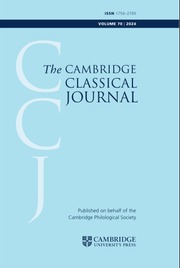No CrossRef data available.
Article contents
OVIDʼS HIDDEN LAST LETTERS ON HIS EXILE – TELESTICHS FROM TOMIS: POSTCODE OR CODE?
Published online by Cambridge University Press: 19 November 2019
Abstract
Ovid is clear that the cause of his exile was a carmen and an error, the one his poem the Ars amatoria (although written several years before his exile in AD 8), the other something which he was never allowed to explain. This paper argues that Ovid has encrypted a plausibly deniable statement contradicting the official reason for his exile in three interrelated telestichs in his Fasti, a work already known to have been revised in exile.
- Type
- Research Article
- Information
- Copyright
- Copyright © The Author(s) 2019. Published by Cambridge University Press
Footnotes
My thanks are due, as ever, to the staff of the Robinson Library of the University of Newcastle-upon-Tyne. In particular, I must record my sincere gratitude to CCJʼs Editor and Readers, without whose patience, encouragement and always constructive criticism this paper could not have come to fruition.


